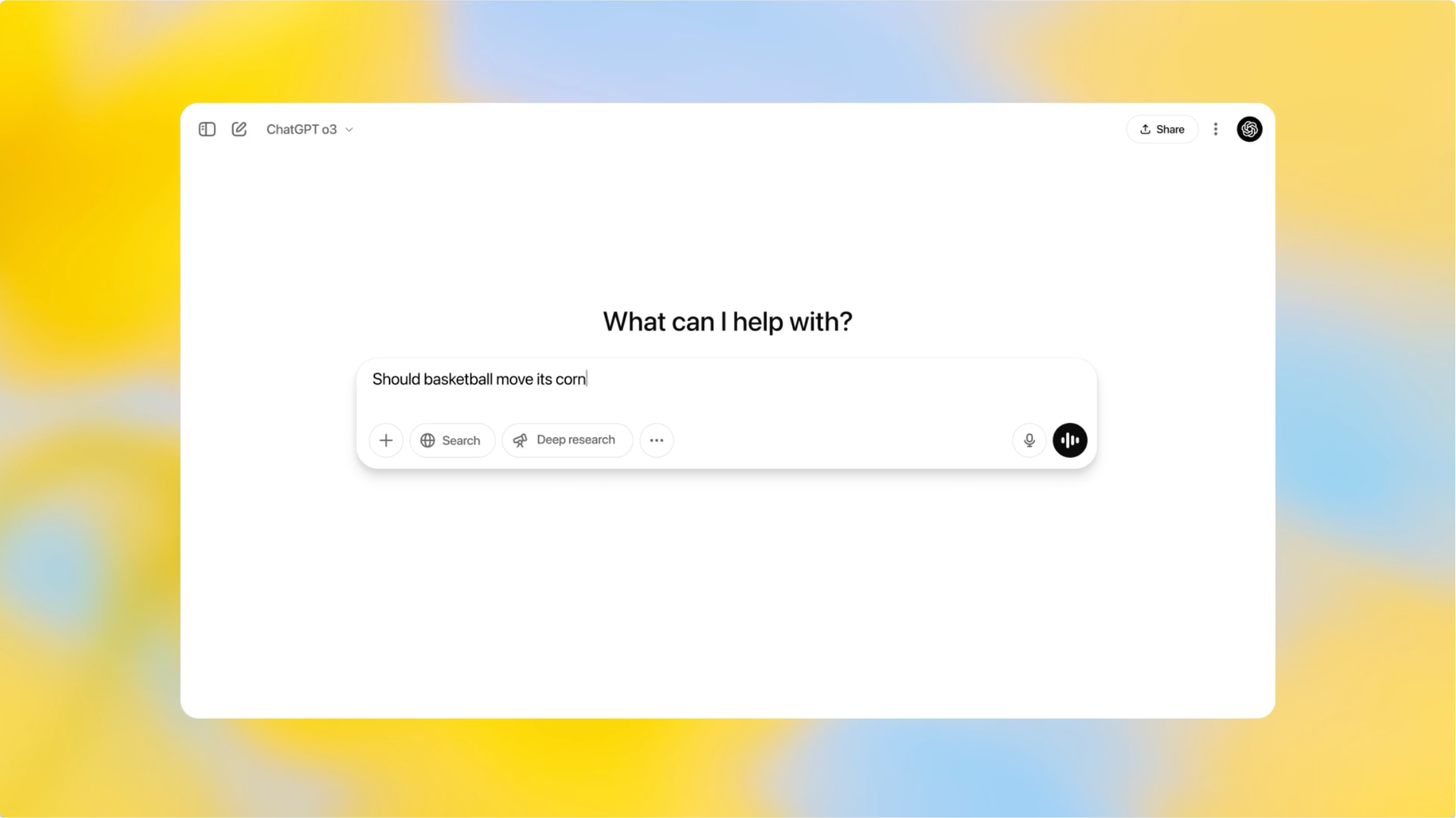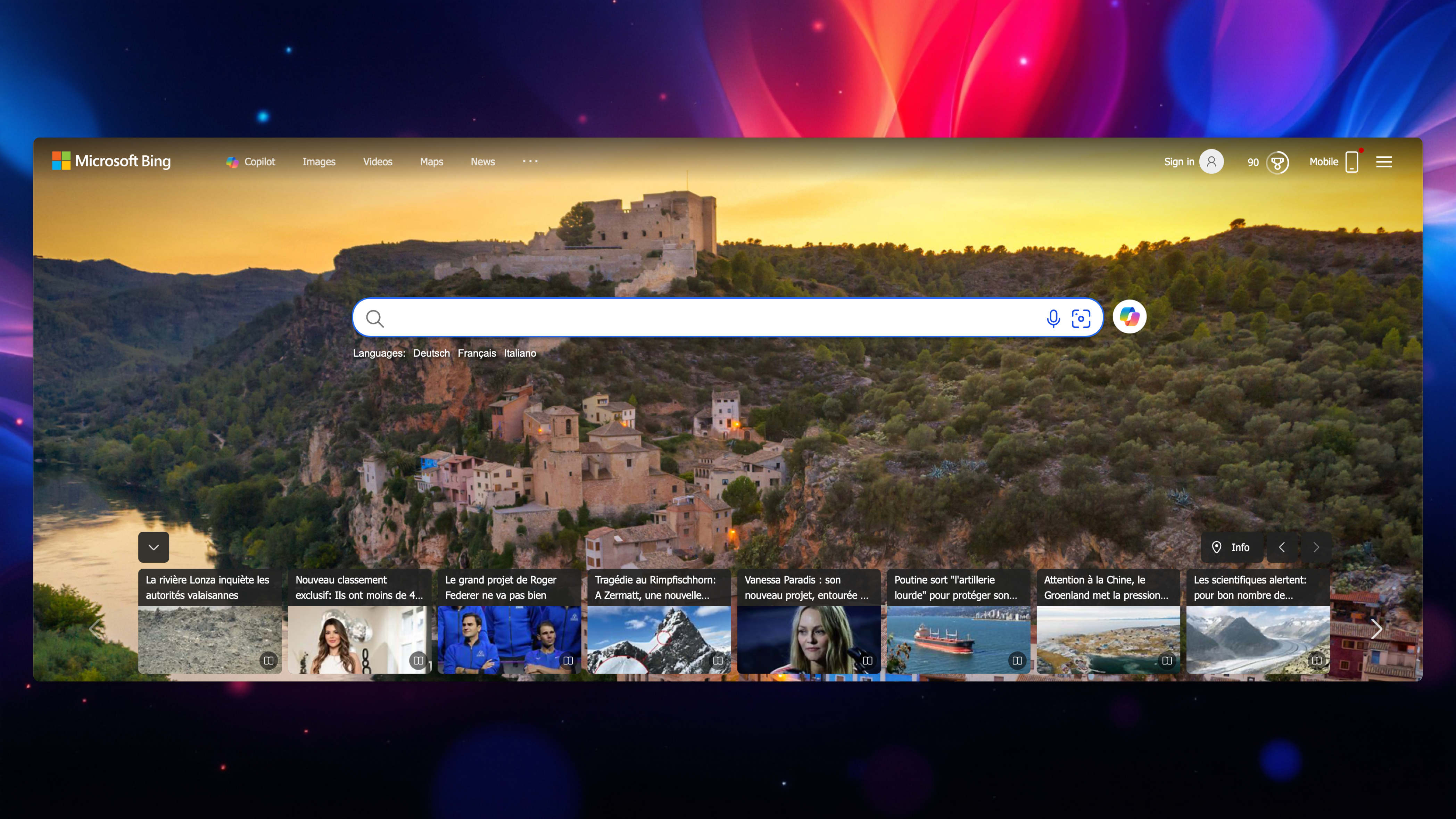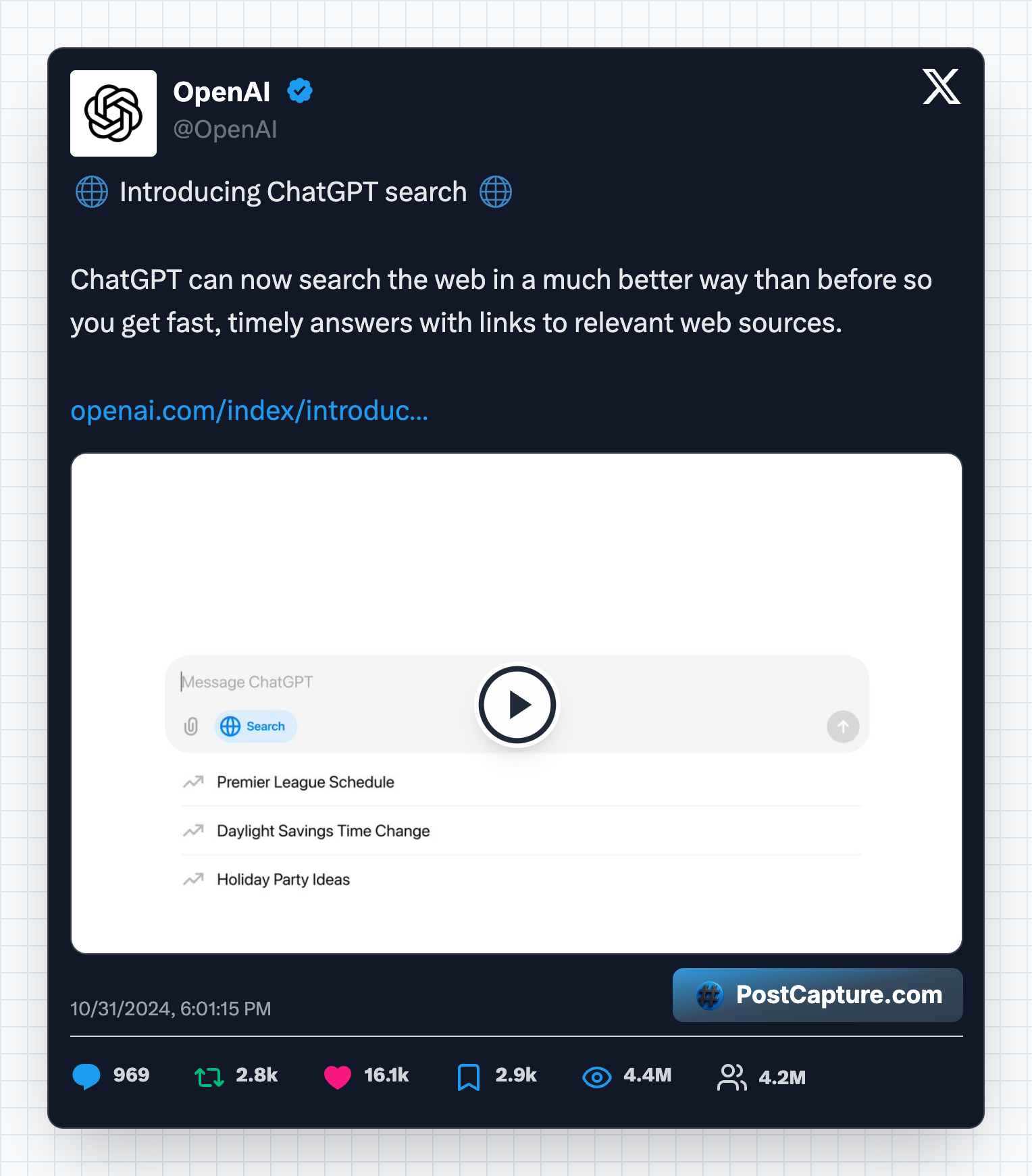OpenAI's o3, o3-Pro, o4-Mini Get Web Search: More AI Use Bing
OpenAI enabled web search for o3, o3-pro, and o4-mini models, massively increasing Bing's reach. Learn how this impacts AI SEO / GEO strategy.

On June 26, 2025, OpenAI made a significant announcement that will reshape how AI assistants access and use web content: web search capabilities are now available for o3, o3-pro, and o4-mini models. This development represents a massive expansion of AI-powered web search usage, with profound implications for AI SEO / GEO (Generative AI Optimization) strategies.
Breaking News
OpenAI's o-series models can now call web search while reasoning, pulling relevant context directly into their chain-of-thought and resulting in more helpful responses. This is priced at only $10 per 1,000 tool calls, making it highly accessible.
What OpenAI Just Announced: Web Search Goes Mainstream
According to OpenAI's official announcement, the company has expanded web search capabilities beyond their previous GPT-4o and GPT-4.1 series to include their most advanced reasoning models. Here's what's changed:
Key Features of the New Web Search Integration
Enhanced Reasoning with Real-Time Data: The o-series models can now access current web information during their reasoning process, significantly improving response accuracy and relevance.
Affordable Pricing Structure: At $10 per 1,000 tool calls for o-series models (compared to $25 for GPT-4o series), this pricing makes web search accessible for widespread adoption.
Chain-of-Thought Integration: Unlike simple web search add-ons, these models incorporate web search results directly into their reasoning process, creating more sophisticated and comprehensive responses.
With OpenAI recommending the o-series models for better web search performance, we're about to see a massive shift in how AI assistants interact with web content.
The Bing Connection: Why This Matters for Your Content
Here's the crucial detail that many are overlooking: OpenAI's web search is powered by Microsoft Bing. This partnership, established through Microsoft's significant investment in OpenAI, means that when these AI models search the web, they're actually searching Bing's index.
The Numbers Tell the Story
- Billions of daily interactions: ChatGPT already processes millions of conversations daily
- Expanded model access: o3, o3-pro, and o4-mini now join GPT-4o series with web search
- API integration: Developers can now build applications that automatically search the web through these models
This creates an exponential increase in Bing-powered searches, even though users never directly visit Bing.com.
Key Insight: Every time someone asks ChatGPT a question that triggers web search, they're effectively performing a Bing search - even if they've never used Bing directly.
What This Means for AI SEO / GEO Strategy
The expansion of web search to OpenAI's most capable reasoning models fundamentally changes the AI SEO / GEO (Generative AI Optimization) landscape. Here's why your content strategy needs to evolve:
1. Bing Optimization Becomes Critical
While Google still dominates traditional search, the AI revolution is giving Bing unprecedented reach through:
- ChatGPT's massive user base
- Microsoft Copilot integration
- Third-party applications using OpenAI's API
2. Content Needs AI-Friendly Structure
AI models process information differently than traditional search engines. Your content needs to be:
- Clearly structured with logical headings and subheadings
- Factually accurate with authoritative sources
- Contextually rich to help AI understand relevance
- Comprehensive to answer follow-up questions
3. IndexNow Becomes Essential
Since these AI models pull real-time information, ensuring your content is quickly indexed becomes crucial. This is where automated solutions like IndexNow submission can make a significant difference.
While manual IndexNow setup is complex and breaks easily, Show Up In AI automatically handles submissions across unlimited domains, ensuring your content is discoverable by AI assistants immediately.
The Technical Challenge: Managing AI Discoverability at Scale
For businesses managing multiple websites, the complexity of optimizing for AI discovery grows exponentially. Here's what you're facing:
Manual Implementation Pain Points
Complex Technical Setup: Implementing IndexNow manually requires:
- Generating and managing unique API keys for each domain
- Setting up webhook endpoints that don't break
- Monitoring submission success rates
- Handling error cases and retries
Multi-Domain Complexity: Agencies and businesses with multiple sites face:
- Exponential management overhead
- Inconsistent implementation across domains
- Higher likelihood of configuration failures
- Time-consuming manual monitoring
Developer Dependencies: Manual solutions require:
- Ongoing technical maintenance
- Developer resources for troubleshooting
- Custom code that needs updating
- Integration with existing content management systems
If you're looking for a simple way to handle IndexNow automatically across all your domains, tools like Show Up In AI can eliminate the technical complexity while ensuring consistent AI discoverability.
Real-World Impact: How AI Search Changes User Behavior
The integration of web search into OpenAI's reasoning models creates several important shifts:
Enhanced User Expectations
Users now expect AI assistants to provide:
- Current information rather than training data cutoffs
- Comprehensive answers that synthesize multiple sources
- Follow-up capabilities for deeper exploration
- Source attribution for fact-checking
Increased Competition for Attention
With AI models synthesizing information from multiple sources:
- Being cited becomes more valuable than being clicked
- Content quality matters more than traditional SEO tactics
- Authoritative sources get preference in AI responses
- Comprehensive coverage increases citation likelihood
Why Automation Is No Longer Optional
As AI search becomes ubiquitous, manual optimization approaches become increasingly inadequate:
The Scale Problem
Individual Site Management: Even a single website requires:
- Regular IndexNow submissions for new content
- Monitoring for submission failures
- Updating technical implementations
- Ensuring continuous functionality
Multi-Site Complexity: For agencies or businesses with multiple domains:
- Each site needs individual configuration
- Failures often go unnoticed
- Updates must be applied across all properties
- Resource requirements scale exponentially
The Reliability Challenge
Manual implementations commonly fail due to:
- API endpoint changes that break webhooks
- Key rotation requirements that aren't handled
- Rate limiting issues during high-volume periods
- Technical debt that accumulates over time
Show Up In AI automatically manages IndexNow submissions across unlimited domains, ensuring your content is always discoverable by ChatGPT, Copilot, and other AI assistants without the technical complexity.
Preparing for the AI-First Search Era
With OpenAI's o-series models now capable of web search, we're entering an era where AI-mediated information discovery becomes the norm. Here's how to prepare:
Content Optimization Strategies
Create Comprehensive Resources: AI models favor content that thoroughly covers topics rather than thin, keyword-stuffed pages.
Implement Structured Data: Help AI models understand your content's context and relationships through proper schema markup.
Focus on Entity Recognition: Ensure your content clearly establishes entities (people, places, organizations) that AI models can recognize and connect.
Maintain Source Authority: Build authoritative backlinks and citations that AI models can use to validate your content's credibility.
Technical Implementation Priorities
Ensure Fast Indexing: With AI models pulling real-time information, quick indexing becomes crucial for visibility.
Optimize for Multiple Search Engines: While Google remains important, optimizing for Bing becomes equally critical given OpenAI's partnership with Microsoft.
Monitor AI Citations: Track how often your content appears in AI-generated responses across different platforms.
Implementation Reality Check
While these strategies are essential, implementing them consistently across multiple domains requires significant technical resources and ongoing maintenance. Many organizations struggle with the complexity of managing AI optimization at scale.
The Future of AI-Powered Web Search
OpenAI's announcement is just the beginning. Here's what we can expect:
Expanded AI Search Integration
- More AI platforms will integrate web search capabilities
- Voice assistants will become more search-dependent
- Enterprise AI tools will rely heavily on real-time web data
- Mobile AI experiences will prioritize search integration
Increased Demand for Real-Time Indexing
As AI models pull current information, the value of quick indexing increases dramatically:
- Breaking news needs immediate AI visibility
- Product updates must reach AI assistants quickly
- Service changes require rapid search engine notification
- Content updates benefit from instant indexing
Growing Complexity of Multi-Platform Optimization
Businesses will need to optimize for an expanding ecosystem:
- Multiple AI platforms with different search partnerships
- Various indexing requirements across search engines
- Different content preferences among AI models
- Evolving optimization best practices as technology advances
Best Practices for AI SEO / GEO Success
To succeed in this new landscape, focus on these key areas:
Content Excellence
Answer Complete Questions: Create content that anticipates and answers follow-up questions users might ask AI assistants.
Provide Clear Context: Help AI models understand when and why your content is relevant to user queries.
Maintain Accuracy: AI models increasingly favor factually accurate, well-sourced content over promotional material.
Update Regularly: Keep content current since AI models now access real-time information.
Technical Foundation
Implement Robust Indexing: Ensure your content reaches search engines quickly and reliably.
Optimize Site Performance: AI models may consider site speed and performance when evaluating sources.
Maintain Clean Code: Well-structured HTML helps AI models understand and process your content.
Monitor Search Console: Track how search engines and AI platforms are accessing your content.
The technical complexity of implementing these optimizations across multiple domains often leads organizations to seek automated solutions that can handle the heavy lifting while ensuring consistent performance.
Conclusion: The New Era of AI-Mediated Discovery
OpenAI's integration of web search into o3, o3-pro, and o4-mini models marks a pivotal moment in the evolution of online information discovery. With these models now capable of pulling real-time web data during their reasoning process, we're seeing the emergence of a new paradigm where AI assistants become the primary interface between users and web content.
The implications are far-reaching:
- Bing's influence grows exponentially through AI interactions
- Content optimization must account for AI processing preferences
- Quick indexing becomes essential for AI discoverability
- Technical complexity increases for multi-domain management
For businesses serious about AI discoverability, the question isn't whether to optimize for this new landscape, but how to do so efficiently and reliably across all their digital properties.
Try Show Up In AI free and see how automated IndexNow submissions can ensure your content is always discoverable by ChatGPT, Copilot, and other AI assistants - without the technical complexity of manual implementation.
Start Your Free Trial

